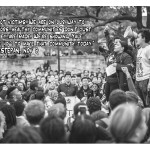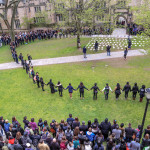by Ishrat Mannan
How often do we ask ourselves whether the things that surround us come at a human cost – the clothes we wear, the food we eat, the buildings we live in, and the land we walk on? Each of these carry stories and histories of labor, sweat, and struggle. If we ask ourselves that question, a deeper concern remains: what do we do with that knowledge?
At Yale, the history of esteemed affiliates and alumni is preserved on the walls. Homogenous faces of power watch over students in dining halls and libraries. Yet recently in Ezra Stiles College, a plaque was installed through the efforts of Head of College Stephen Pitti that reads:
“As a leading minister and intellectual in the 18th century, Ezra Stiles controlled the lives of three young people. Two were African American and one was Native American (Western Niantic). One was a slave (he was manumitted), and the others were indentured servants, but none were free. We remember them here.”
This plaque does not challenge the narrative of honoring people; it corrects it. This effort to rectify history reminds us all that the labor and livelihoods of people of color are often spent laying the groundwork for others’ prominence and power, literally and figuratively, only to be swept under the rug.
In the words of Milan Kundera: “The struggle of man against power is the struggle of memory against forgetting.” This struggle is not just tasked to the individual, but to institutions like Yale, and to nations like the United States of America. As someone who has lived in the South, I have seen what an uncritical celebration of Confederate flags breeds – at best, ignorance, and at worst, pride in white supremacy. The story of Yale, just like the story of America, is incomplete without its beautiful and ugly parts.
The Ezra Stiles plaque emerges after a year of intense and ongoing college-wide conversations. While the focus has primarily rested on FKA Calhoun, this plaque is a step forward in recognizing that all the residential colleges’ namesakes – with the exception of Abraham Pierson – owned slaves in some capacity. What separates John C. Calhoun from the rest is the degree to which he “wielded enormous political influence on the preservation of slavery” (http://www.yaleslavery.org/WhoYaleHonors/calhoun1.html).
Currently the Yale administration is setting up a Committee to Establish Principles on Renaming to create guidelines and protocols for removing historical names, including that of FKA Calhoun College. It remains to be seen if this endeavor will contend with racial legacies effectively.
Building towards a future without racism requires acknowledging our past. This starts with a conversation – with a plaque – that pushes us to reckon with the history that surrounds us, fully and honestly.


